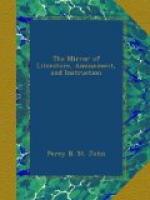“Besides being involved in these vexatious disputes, Marlborough was again harassed by the workmen employed at Blenheim, who in 1718 renewed their actions against him for arrears of wages due since 1715. He resisted the demand; but a decree issued against him, from which he appealed, though without effect, to the house of lords. No doubt there was excessive meanness here on the part of government, of which Marlborough had just cause to complain. Yet was it beneath the dignity of the greatest man of his age to dispute with his ungrateful country about 9,000L. Better would it have been had he paid the debt at once; for the sum was not such as to put him to the smallest inconvenience, and posterity would have more than recompensed the loss by the judgment which it would have passed on the entire transaction. In spite, however, of these multiplied sources of disturbance, it does not appear that the latter years of this great man’s life were spent unhappily. Frequent returns of illness he doubtless had, each of which left him more and more enfeebled in mind and body; but his intervals of ease seem to have been passed in the society of those who were well disposed to cheat him, as far as they could, into a forgetfulness of his fallen condition. He played much at chess, whist, piquet, and ombre; he took exercise for awhile on horseback, latterly, on account of weakness, in his carriage; he even walked, when at Blenheim, unattended about his own grounds, and took great delight in the performance of private theatricals. We have the best authority for asserting, likewise, that he was never, till within a short time of his death, either indisposed or incapable of conversing freely with his friends. Whether in London, at Blenheim, Holywell, or Windsor Lodge (and he latterly moved from place to place with a sort of restless frequency), his door was always open to the visits of his numerous and sincere admirers; all of whom he received without ceremony, and treated with peculiar kindness.
“In this manner Marlborough continued to drag on an existence, which, when contrasted with the tenour of years gone by, scarcely deserves to be accounted other than vegetation. In 1720, he added several codicils to his will, and ‘put his house in order;’ and in November, 1721, he made his appearance in the house of lords, where, however, he took no prominent part in the business under discussion. He had spent the winter too in London, according to his usual habits, and was recently returned to Windsor Lodge, when his paralytic complaint again attacked him, with a degree of violence which resisted all efforts at removal. On this occasion, it does not appear that the faculties of his mind failed him. He lay, indeed, for the better part of a week, incapable of the slightest bodily exertion, being lifted from his couch to his bed, and from his bed to his couch, according as he indicated a wish to that effect; but he retained his senses so perfectly as to listen with manifest gratification to the prayers of his chaplain, and to join in them, as he himself stated, on the evening preceding his death. The latter event befell at four o’clock in the morning of the 16th of June, 1722, ‘when his strength,’ says Dr. Coxe, ’suddenly failed him, and he rendered up his spirit to his Maker, in the 72nd year of his age.’




